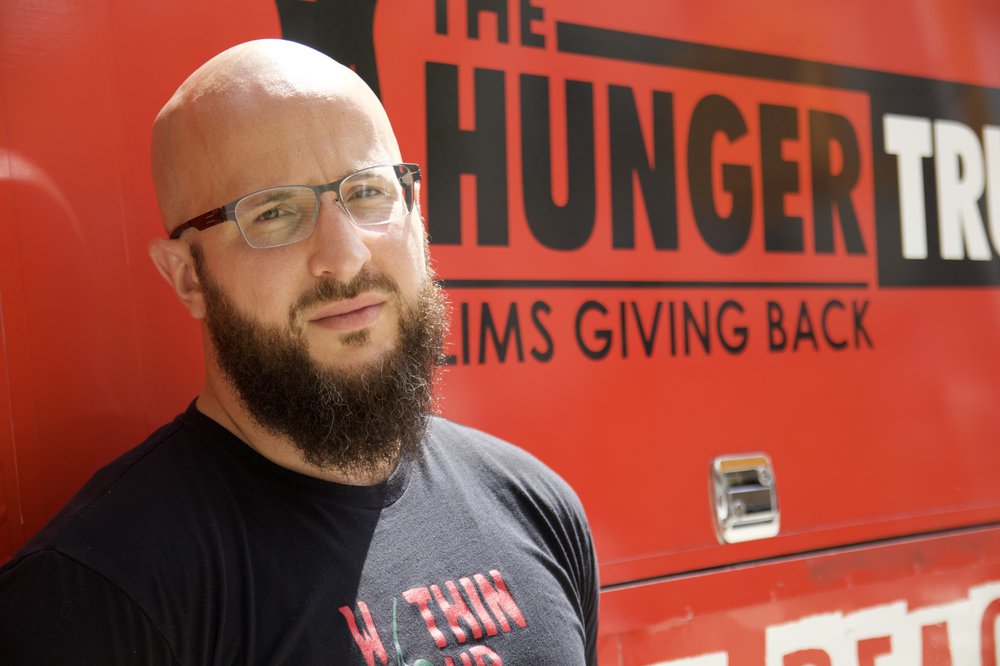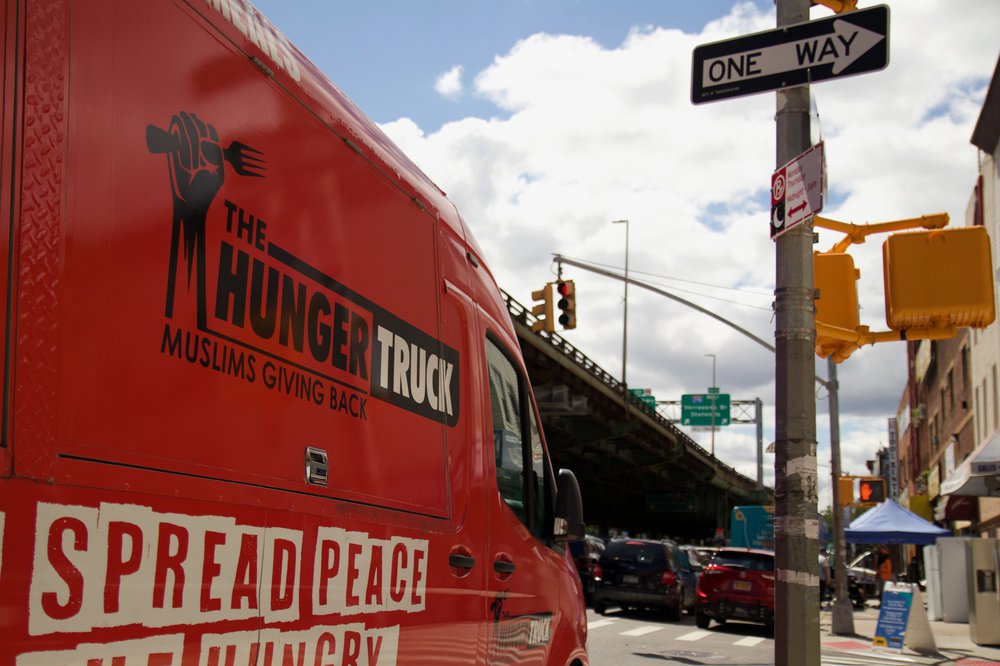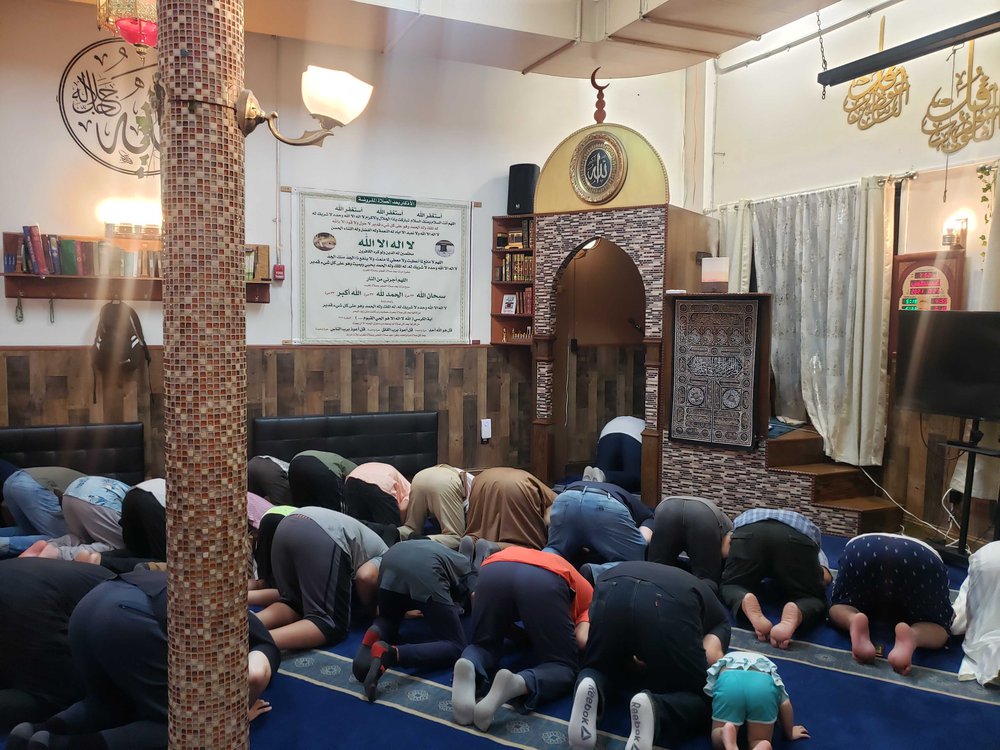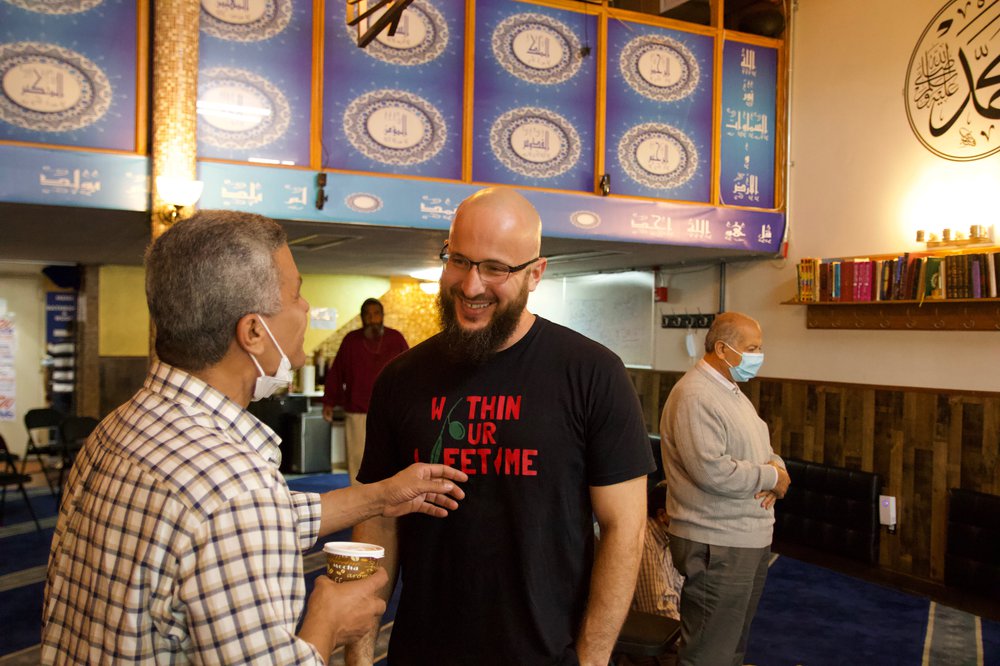How The NYPD Infiltrated A Muslim Charity In The Years After 9/11
Sept. 7, 2021, 5:01 a.m.
The police monitoring upended one man’s life and left a legacy of trauma.

September 11th and NYPD: The Legacy
In this 20th anniversary series, WNYC/Gothamist is exploring how the September 11th attacks fundamentally changed the NYPD, its approach to policing and the city's relationship with the nation's largest municipal police department. For links to all of the stories we've published and for more about how WNYC, Gothamist and New York Public Radio is recognizing this anniversary, scroll to the bottom of this story.
Mohamed Bahe has his hands full as he shuffles between his food truck and the kitchen at the Muslim Community Center (MCC) in Brooklyn’s Sunset Park. He’s busy preparing for a twice-weekly food giveaway for the homeless in Herald Square — an initiative of Muslims Giving Back (MGB), a volunteer-run food drive that operates out of the MCC.
Bahe, a 37-year-old Queens native, and his network of volunteers are passionate about the mission. But despite their good works, they’ve faced significant challenges. Like other Muslim communities in New York following 9/11, they have been targeted and monitored by the NYPD. And they say the effects still linger.
For Bahe, it started in 2012. He says he’d wanted to combat negative stereotypes, so he and some friends created a volunteer group for Muslim Americans to run food drives across the city. Soon after, however, Bahe says he noticed something suspicious.
“It came to the point where I was literally being followed by two cops, and I told myself it was in my head,” Bahe recalled. “But it was always the same cars, and every time I stopped, they stopped – fully tinted, unmarked cars.”
After Bahe shared his experiences in a group chat, there was a startling confession: A member of the group was working as an informant for the NYPD.
“For six months he was with us. And when we were reading it,” Bahe said, referring to the chat from the informant, “We thought he was trying to prank us.”

The informant, according to Bahe, had spied on Muslim students at local colleges. From there, the police honed in on Muslims Giving Back.
“They told him there was a group of guys that are meeting up and young that might be up to no good,” Bahe said. “But all we do is feed people.”
The monitoring took different forms, according to court documents, from gathering full names and common meeting places to shadowing alleged suspects. In exchange, the NYPD allegedly told the paid informant they would drop minor charges on his record, according to Bahe.
This was not an isolated incident. Soon after 9/11, an unknown number of informants and plainclothes officers were placed around the New York City area and beyond to eavesdrop on and monitor Muslim communities. That included attending prayer services, listening in on conversations, stationing officers near mosques for photo and video surveillance, mapping entire neighborhoods based on ancestry, and even starting conversations about terrorism and reporting the responses to the police. This information would then be entered and stored in NYPD intelligence databases, according to the ACLU.
These practices, according to Bahe, only added to a growing fear and paranoia within the community.
“At first I wasn’t worried because I wasn’t doing anything illegal,” Bahe said. “But I started to get scared that these guys are going to follow me and put something in my car after I park it.”
When the NYPD’s secret intelligence operations were made public following an investigation by the Associated Press, the lives of Bahe and his friends were in shambles. The mosque they attended in Brighton Beach banned them for fear they might attract more informants.
“They got scared and told us they didn’t want us there anymore, they blamed us,” Bahe said. “And I’m like ‘we didn’t do anything, you knew what we were doing,’ we literally had a space in the mosque that was a food pantry…but they told us there were too many problems.”
Others in the community also began to distance themselves from the group. Eventually, even Bahe’s core group of friends began to break up under the pressure.
“A lot of our members at that point, like 99.9 percent [of them] just bounced,” Bahe said.
But those who remained in the group, along with several other individuals and institutions, sued the NYPD for using religious profiling and unwarranted surveillance to conduct investigations.
“We were the only Muslim charity to sue the NYPD,” Bahe said.

The lawsuit was eventually settled. The NYPD agreed to curtail its monitoring of the Muslim community and limit the use of undercover officers and informants. The city also appointed a civilian representative to sit in on the internal committee that reviews investigations. Most notably, the settlement prohibited investigations in which race, religion or ethnicity were motivating factors.
Still, to this day, the NYPD denies that a surveillance program targeting the Muslim community ever existed.
“That was a name, a hashtag given to it by critics and advocates who were critical of some of the [NYPD’s] practices,” John Miller, the NYPD’s Deputy Commissioner of Intelligence and Counterterrorism, told WNYC/Gothamist. “There was a time where there was a level of paranoia where everybody felt spied on and there were so many rumors going around that people didn’t know how to separate truth from [fiction].” Miller was named in the lawsuit.
That stance is reflected in the settlement, which also notes that the results of the lawsuit will not be deemed as an admission of any fault or wrongdoing on the part of the city.
Yet, not much came of the NYPD’s investigations. The department’s monitoring and mapping operations didn’t result in a single lead or terrorism investigation.
Years have passed since the lawsuit and subsequent policing reforms, but some experts say local Muslim Americans still experience discrimination as a result of both the monitoring and 9/11 itself.
“Muslim communities in New York, for example, experienced 9/11 just as everyone else did, and the anti-Muslim activity that resulted,” said Professor Caleb Elfenbein, the director of the Center of the Humanities at Grinnell College and author of Fear in Our Hearts: What Islamophobia Tells Us About America. “So, in that way, it was kind of doubly traumatizing for Muslim communities and communities that others understood to be Muslim.”

After 9/11, Elfenbein created Mapping Islamophobia, a visual data website dedicated to tracking hate crimes against Muslim Americans. His dataset found that while anti-Muslim activity has persisted since the attacks, it spiked in 2015, coinciding with President Donald Trump’s campaign.
Mohamed Bahe remains undeterred. Over the course of the lawsuit, he and his group rebuilt the volunteer-run charity Muslims Giving Back. By 2015, they had raised enough money to rent a building in Sunset Park, which now houses the Muslim Community Center. In addition to a food pantry, it houses a mosque, youth programs, and mental health and counseling services. And now, a 24/7 food kitchen in Bay Ridge is in the works.
Still, Bahe admits that people at the center find it difficult to move on from the past and trust their surroundings again.
“We have history,” he said. “It leaves people a little traumatized, and this was years back.”
Joseph Gedeon reported this story for the Gothamist/WNYC’s Race & Justice Unit. If you have a tip, some data, or a story idea, email him at jgedeon@wnyc.org or reach out on Twitter @JGedeon1.
September 11th Special Coverage
New York Public Radio has extensive programming planned to commemorate the 20th anniversary of the attacks of September 11, 2001. It includes news analysis and coverage on WNYC radio and Gothamist, special live coverage of the memorial on September 11, news coverage in the days leading up to September 11, and music of reflection and commemoration on classical station WQXR. Details follow:
September 11 and NYPD: The Legacy
About this series: Dozens of journalists and engineers in the WNYC newsroom came together to produce this series for Gothamist and WNYC radio. The series, which ends on September 11, explores how the terror attacks 20 years ago fundamentally changed the NYPD. The 20th anniversary comes amid another critical moment in U.S. history: a reckoning over race and policing, here in New York City and across the country. Over the last two decades, the NYPD has undergone a dramatic transformation, growing in capacity, reach, and power. Those changes are evident today in virtually every aspect of policing in New York City -- from the department’s enforcement around street protests, to its vast international network, to its presence on mass transit, to its all-round philosophy of public safety.
Day One: NYPD's history from founding to 9/11
Day Two: How NYPD's Powers Expanded After 9/11
Day Three: A Legacy of Police Surveillance (Part One and Part Two)
Day Four: See Something, Say Something
Day Five: America's Mayor and NYPD
Day Six: Living with Trauma: COVID-19 and 9/11; The Sacrifice of Survivors
Live Memorial Coverage
On September 11, WNYC's Brian Lehrer will host special live coverage of official memorial ceremonies starting at 8:35 a.m. At 11 a.m., WNYC will air "Blindspot: The Road to 9/11," a two-hour radio documentary adapted from the nine-part podcast hosted by WNYC's Jim O Grady.
WQXR
Classical music station WQXR also has special programming planned throughout the day on September 11. The program includes a asegment on John Adams’ Pulitzer Prize-winning composition "On the Transmigration of Souls," the Brooklyn Youth Chorus and the New York Philharmonic.For other radio news programming planned during the week click here.